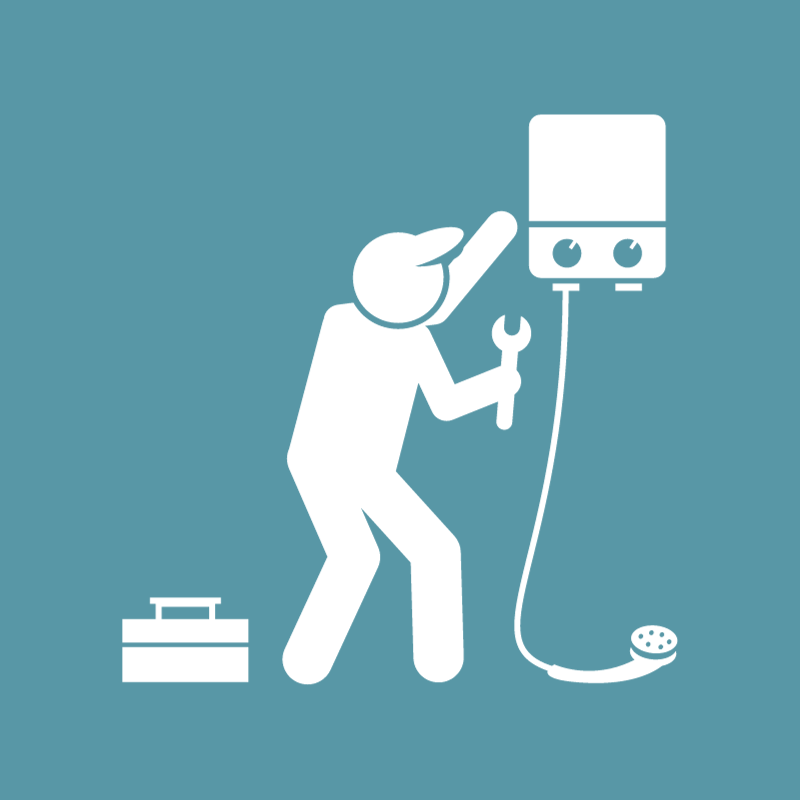Water heaters have existed for many years, with the first storage tank type appearing in 1889. This invention allowed homeowners the luxury of steaming hot water for bathing, cooking, and other household activities.
Water heaters are an integral part of modern living and it is hard to imagine life without the convenience of readily available hot water.
In this article, we will learn about two of the most popular types of water heaters, the traditional tank style and the tankless variety. We will review problems frequently associated with these types of water heaters and look at signs that indicate it is time to replace your current model.
Common Heater Options
Although modern water heaters are available with heat pump technology, solar power, or condensing types, this article will focus on two of the most common water heaters in the US today.
Traditional Water Heater
These water heaters are the least expensive to purchase and install and outrank all other types on the market. It comprises an insulated storage tank that stores a predetermined amount of water that is heated and held until hot water is needed.
How They Work
Cold water enters the tank and, depending on the power source, heats the water using electric heating elements positioned inside the tank or by a gas flame below the tank. A thermostat regulates the water temperature to guarantee consistent hot water when needed.
When a tap is opened, signaling the need for hot water, the water in the storage tank is pumped up through the fixture’s hot water supply line and exits the faucet. As the tank empties from the top, fresh cold water enters the tank to refill it, and the heating process is repeated.
Common Problems
Inefficient
Traditional heaters have an efficiency rating of 60-65%, meaning 40% of heat produced is lost during normal operation. Compared to other heaters, this rating is poor and wastes energy.
Limited Supply
There is a fixed number of gallons of water sitting inside the tank. That is the maximum amount of hot water that is immediately available, and if the heater was incorrectly sized it could mean someone will be taking a cold shower.
Reduced Recovery Time
As hot water is used, the system automatically replaces what was pumped out and begins to heat it to supply as much hot water as is needed. This is what is meant by recovery time. How long does it take for the system to have a full tank of hot water after some hot water has been used? As heaters age, they are less efficient at recovering a full tank of hot water, mainly due to sediment accumulating on the floor of the storage tank.
Flooding
An exploding water tank is a disaster every homeowner fears, and when water heaters are installed on upper floors, the damage quickly multiplies when a storage tank fails and floods your home.
Space
The space a tank-style heater requires is large compared to tankless water heaters. In some cases, this is not considered a problem, but in small homes or multi-family dwellings, space is at a premium.
Constant Heating Of Water
Traditional heaters heat the entire tank of water, but if non is used, it naturally begins to cool. When the thermostat recognizes it needs to be reheated, it turns the burners back on. This perpetual heating wastes energy, and in today’s economy, no one can afford to waste money.
Signs Of Failure
Traditional heaters have an expected lifespan of 8-12 years. Here are some well-known signs your heater may be on its last legs.
Noises
Popping and banging noises are common in aging water heaters. This is caused by the sediment collection in the tank and can lead to dangerous overheating. If you begin to hear unusual noises start considering a replacement.
Fluctuating Temperatures
If your water temperature is inconsistent or cannot heat up to the temperature you require, it may be time to replace your heater.
Low Pressure
Although low pressure can be associated with other conditions, if your hot water is only low, you can be certain sediment buildup is the problem.
Discolored water
As heaters age, the storage tank can begin to rust from constant exposure to water. An anode rod is installed to attract corrosive materials leading to rust but they can become overpowered and stop functioning.
Lack Of Hot Water
Obviously, the lack of hot water from your water heater is a clear sign yours will need replacing, especially if it is at the end of its expected lifespan.
Leaks
A leaking water heater is no laughing matter, as even the smallest leaks can result in costly damages. Sometimes a pipe connection vibrates and loosens, but any leaks in a water heater must be professionally addressed as soon as possible.
Frequent Service Calls
An occasional call for service should be expected, but when the calls multiply, it only makes sense to look into replacing your unit.
Higher Energy Bills
As the efficiency of your water heater declines, the cost of operation naturally increases. You must weigh the cost of a new heater against the increased cost of running your system to decide if a replacement is right for you.
Tankless Water Heaters
Tankless water heaters were first introduced in the 1990s and have been increasing in popularity ever since. They are wildly more efficient than traditional heaters, with an average energy savings of more than 50%.
They provide unlimited hot water, and many now have built-in recirculation pumps that guarantee instant hot water just when you need it. They are also equipped with state-of-the-art features such as Smart technology which allows homeowners remote communication and notifications when maintenance service is needed.
How They Work
A flow sensor detects when hot water is being called for and signals the control board. In gas-powered models, the control board turns on the fan and air is pulled into the unit, and the burner ignites.
The heat exchanger captures the heat produced by the flame and transfers it to the cold water that enters the unit directly from the mains as it travels through the tubing of the exchanger.
As the heated water exits the unit, its temperature is continuously monitored, and necessary adjustments are made to ensure consistent temperatures.
Any fumes generated are promptly exhausted to the outdoors to ensure the safety of the inhabitants.
Common Problems
Overload
All tankless heaters have a flow rate which indicates the amount of hot water that can be used simultaneously. If the demand becomes higher than the flow rate, the system can malfunction.
Mineral Buildup
Hard water contains minerals that can build up on the components of a tankless heater that, over time, can restrict and even stop water flow. Descaling the system can help with this issue.
Gas Or Electrical Issues
If the water fails to get hot, it may be because the gas supply has been interrupted or an electric issue has popped up. These are serious issues requiring a licensed professional.
Cold Sandwich Effect
This occurs when back-to-back showers are needed. When the first person turns off the water, some hot water remains in the pipes. When showerer number two turns on the water, this remaining hot water comes out briefly, followed by cold water, and then hot again. Cold water is ‘sandwiched’ between hot water, thus giving it its name.
Signs Of Failure
Although far less problematic, tankless heaters have a lifespan of approximately 15-20 years with proper maintenance. So, although they are more costly to purchase and install, their longevity is very enticing. Here are signs your heater may require replacement.
Low Pressure
Because these units are small in size, they are more quickly affected by corrosion, and corrosion can lead to clogs and low water pressure. You will know your heater is in trouble when only the hot water pressure is affected.
Unit Keeps Turning Off
Sediment buildup is common in tankless heaters, so they are often installed with a whole-house filtration system to reduce sediment accumulation. Over time the sediment can overpower a heater, and it will shut itself off for safety reasons.
Lukewarm Water
Gas line leaks or blockages can be the cause of this inconvenience. You must contact a professional immediately if lukewarm water exits your tankless heater. It may be a minor issue, or it could save your life.
Leaks
This is a rare occurrence and is usually the result of broken valves, but it could also indicate a replacement heater is needed.
Looking To Replace Your Hot Water Heater?
Replacing a hot water heater is part of properly maintaining a home. It is an inevitable event that will occur several times during home ownership. It should always be completed by a licensed and insured professional with the expertise and experience to guarantee a safe and well-working appliance to grant you the comfort and peace of mind you deserve.
If you are experiencing any of the problems associated with water heaters or recognize your heater is nearing the end of its expected lifespan, then give us a call. Our customers trust us to provide outstanding service while keeping their safety and comfort our first priority.

